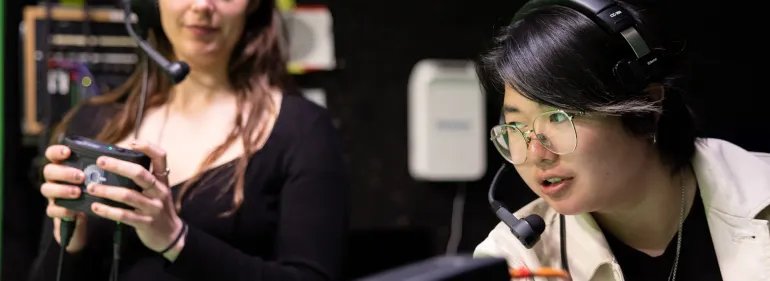BA in Communications

Course Overview
Take the first steps to a career as a working media professional
This hands-on course builds the knowledge and skills needed today in the changing and dynamic world of media, whether is working online, in radio, TV or photojournalism, giving you the practical, real-world experience needed to succeed.
Why Study Communications at Griffith College?
The BA in Communications is a three-year full-time programme which aims to give learners an introduction to communications platforms including photography, radio, journalism, and TV. The course involves both practical and academic projects and gives students the chance to work in real journalistic situations over the course of six semesters. Graduates of this programme can also progress onto the final year of the BA (Hons) in Communications and Media Production to obtain a Level 8 qualification. In this course, students will:
- Develop writing, radio, video and photography skills, and explore reporting, feature writing and investigative journalism, through work with the college newspaper, magazine and radio station, while filming and editing your own short video pieces.
- Gain an understanding of essential journalism skills, media history and social structures.
- Write, edit and design their own publications;
- Build a portfolio of work to show future employers.
- Influence their career path with specialisation in two elective choices.
- Have access to state-of-the-art facilities on campus including radio station, photography studio and film and TV studio;
- Be able to access a National Union of Journalists press pass.
Intake Dates
- Dublin - Full-Time - September 2025
Are you applying through the CAO?
Read our CAO Hub for everything you need to know about applying through the CAO!
Course Codes
- Dublin: GC465
- Cork: GC265
What our students say

After completing my BA Journalism in Griffith College, I progressed into the BA Communications and Media Production course as I felt that this would help me to decide on what career path I would like to take. By doing this extra year, I was able to develop my skills further and this allowed me to also connect with more students in Griffith College too. This boost in confidence helped me to push past some of my fears, such as public speaking and it also helped me to realise that I really wanted to work in the area of environmental communications - an area which is growing in Ireland. I feel that I have Griffith College to thank for giving me the confidence and motivation to progress in my career path.
BA in Journalism

During my time studying Communications in Griffith College Dublin I was introduced to helpful lecturers and lifelong friends. By exposing me to so many different areas of journalism, the course helped me to figure out what I am interested in. I learned skills which have stayed with me and have helped me in my career. My experience was a joy from start to finish; I wouldn’t change a thing!
BA in Communications
Course Details
Year One
The module is designed to introduce learners to the diverse world of digital media. The module aims to provide learners with the ability to use software and develop an online digital media platform and be able to apply this learning to produce an online space for sharing high-impact writing and content.
Learners are also introduced to the techniques and design principles of modern digital and print production. They become familiar with the technology used in the communications industry.
This is a practical module, which aims to equip learners with basic skills in mobile technologies relating to research and concept development; mobile Journalism specialising in video production (image and sound) technique and approach; visual storytelling and sequencing; editing (technical skill and basic craft); and publishing material online.
Learners make a series of short factual vlogs to build practical skills on a topic of their choosing to be published online weekly. Learners make a short documentary/news/ factual video on a topic of their choosing approximately 30-60 seconds in duration, for multi-platform distribution for delivery as part of a news package.
The module aims to enable learners to explore basic photographic principles and camera settings, with an emphasis on images within communications media. Learners gain an understanding of Photoshop and its basic tools for resolution, formatting, image capture and image manipulation. Practical assignments provide learners with the experience necessary to use to their advantage the technical and digital resources available to them
This module aims to develop learners’ writing skills in the areas of punctuation, grammar, structure, syntax and Harvard referencing so that they can produce well-written academic essays.
The module has the objective of developing learners’ research skills, and cultivating learners’ presentation skills, their confidence in presenting, capacity to develop and critique an argument, and their capacity to prepare well for pitches and presentations using appropriate software and application of research skills.
The module also aims to nurture and enhance learners’ note-taking and study skills, online and offline research skills, and to cultivate an informed awareness of contemporary social, political, cultural and economic issues.
The module aims to make learners aware of how society affects the opinions and actions of groups and individuals. It examines the origins of the study of society, the changes brought about by the industrial revolution in western society and their impact on the rest of the world. It makes learners aware of how society affects the opinions and actions of groups and individuals and examines the impact of sociological research on some groups, events and issues in society and to explain its relevance.
The module offers an analysis of the historical evolution of human communication. The world we live in today is one where humans communicate and share information in an ever-growing range of media, from text to satellites, from billboards to blogs.
The module introduces learners to the key events and epochs in the history of human communications.
Learners analyse the impact of key changes in communications media, starting from the earliest known forms of media, through to the invention of the printing press, the emergence of a literate reading public, the development of newspapers, the invention of radio, film and television, and into the digital age.
Cultural Journalism is embedded in the arts and creative output. This module seeks to work towards defining what cultural journalism is and introduce learners to the genre of arts writing and practice. This is a skills-based module which aims to provide learners with the necessary tools to produce meaningful arts and culture journalism content to a deadline.
Learners discover how cultural journalism is produced and presented across the spectrum of print, online and broadcast media and acquire the skills to evaluate and critique cultural journalism in its various iterations.
This module is designed to introduce learners to the basic prerequisites of radio production and broadcasting, to enable them to learn the skills necessary to work in radio production, research, reporting and presentation. There is an emphasis on writing for radio.
Learners also learn how to use studio based technical equipment. They learn about studio-based recording and putting live programmes on air.
Learners are also introduced to Mo-Jo or Mobile Journalism, which is recording, editing and uploading material on to their mobile phones. As well as classes with lecturers, there is a master class given by a guest lecturer, an experienced radio broadcaster.
This module aims to introduce learners to a variety of writing styles such as news, features and general content creation.
Learners develop an understanding of the structures of these different styles of writing and how to adapt their style for particular audiences. They are also encouraged to engage with published material as a means of cultivating these skills.
They are required to progress their presentation skills during the module as a means of explaining and elaborating on their story ideas.
Year Two
This module aims to introduce learners to the workings of contemporary society and to enable learners to analyse key issues in social and political development. The objectives of this module are to have learners:
- develop their thinking and analytical skills beyond the scope introduced in Understanding Society;
- build a habit of independent reading and inquiry into complex societal issues, both in a domestic and international context. Learners get to compare and contrast different opinions, interpretations and theories on contemporary political issues, and
- generate independent academic views on societal issues.
The aims of this module are twofold. The first is that learners advance the technical and design skills acquired in the first year. The main advancement sees learners apply their knowledge in the area of design to research, develop and create their own product. The second aim is to provide a framework for learners to compile a portfolio of suitable work to enter into a learner media competition.
This module is intended to significantly increase the learners' skills base, bringing their work to commercial standards of expertise and artistry.
Studio lighting and digital imaging techniques using industry-standard software form the main body of the module. A more practical approach increases the learner photographers’ confidence in their own capacity.
This module is designed to build on learners’ knowledge of radio production and broadcasting, to enable them to greatly improve on their existing skills and prepare them fully to work in a professional broadcast environment with an emphasis on production, research, reporting and presentation. Documentary making is also a part of this curriculum.
A key component is advanced writing for radio. Learners also advance their technical skills in a major way in both studio and outside broadcasting.
Learners increase their skills in Mo-Jo or Mobile Journalism that is recording, editing and uploading material on to their mobile phones.
The module aims to equip learners with the fundamental principles of media law in order to be able to work within the legal boundaries as a media professional.
It also aims to provide a solid grounding in media ethics for journalists and other content creators and to give learners the tools with which to make professional ethical decisions.
Learners gain a broad understanding of journalism ethics with an in-depth look at regulatory bodies such as Office of the Press Ombudsman and The Press Council of Ireland.
The aim of the module is for learners to build on the journalistic skills acquired in stage one. Learners receive a grounding in the fundamentals of a number of writing styles and structures which develops their ability to write to a professional standard.
Learners gain an understanding of sub-editing and how editing their own work can make them better writers. The module also aims to advance learners' understanding of the English language and improve their skill in working with words. It aims to give them confidence and boost self-esteem in their writing skills.
This module looks to expand the skills for sourcing, researching, interviewing and writing a variety of types of print journalism. It develops the learners’ ability to communicate their ideas in the form of pitches with the aim of encouraging them to get their material published.
Narratives are used by individuals and audiences to understand and make sense of the world they live in. This module allows learners to reflect on the narratives we tell of ourselves and the narratives that others tell us.
The aim of this module is, therefore, to equip learners with the language and skills necessary to ‘read’, analyse and unpack texts. Texts, in this context, are understood in its broadest sense and include newspaper articles, books, podcasts, imagery, television and film.
The module aims to explore what we mean by narrative and key terms are analysed including genre, representation, myths, image, codes, meaning and structure. This module also looks at some contemporary and historical screen narratives. The ultimate aim of the module is to encourage learners to become active readers of texts.
Shorthand is a valuable skill for journalists. Despite advances in recording technology, many situations still exist where for legal or interviewee preference reasons, the most suitable form of newsgathering requires accurate and fast shorthand.
This elective module enables learners to understand the need for good shorthand skills for journalists; train in current best practices; acquire substantial structured practice and improve their shorthand skills.
This elective module aims to build on the skills acquired in Thinking, Writing and Presenting in stage one of the programme and is a professional development module.
It is designed with the objective of further improving learners’ academic and journalistic writing, research and presentation skills. In terms of academic writing, it takes the basic skills of referencing and essay structure learned at stage one and aims to develop them further, looking at ways to further improve essay writing and research via online research, essay style, research tips and sentence structure.
In terms of journalistic writing, it aims to further advance the learner’s writing style, knowledge of syntax and grammar rules. In relation to presentations, the module aims to improve learners’ application of PowerPoint, effective online research and preparation, body posture, voice projection and fielding questions. This elective module also develops learners’ ‘presenting to camera’ skills.
Year Three
This module supplies learners with a key link between the media content they produce on other modules and its commercial context.
Learners become conscious of the marketing and advertising context of their work and how that impacts on measures of audiences, along with the regulatory, funding and intellectual property aspects of commercial media. As the sources of media revenue continue to change learners need an understanding of that process.
The module aims to impart a theoretical understanding of the genre of investigative journalism, its history, and its crucial role in maintaining democratic societies.
Through the use of case studies, it aims to demonstrate the power and impact of high-quality investigative journalism. The module aims to develop learners understating of the history and importance of the freedom of information act, as well as how to use it and how it might be improved, and to impart the unique set of ethical issues connected with the genre.
It also aims to assist learners in understanding and identifying new opportunities for investigative journalism online, as well as to cultivate learners’ skills at story identification, pitching, and completing their own investigative news reports.
The aim of this module is to enable learners to further develop the practical skills required to initiate, plan, research, write, edit and sub-edit quality news reports, feature articles and content for specific audiences; to equip learners with a practical and theoretical understanding of interview skills, pitching stories, freelancing, ‘news values’ and spot news, such as the reporting of demonstrations; to embed a critical awareness of the dynamics of a democratic public sphere and the role of a free press in maintaining it; and to design and publish as part of a team, a hardcopy magazine.
This is a practical module which aims to equip learners with basic skills in video, including: research and concept development; video production (image and sound) technique and approach; visual storytelling and sequencing and editing (technical skill and basic craft).
Learners will make a series of short factual vlogs to build practical skills introduced week by week. Each learner makes a short documentary/news/ factual video on a topic of their choosing approximately 3- 5 minutes in duration, for multi-platform distribution for delivery on the final week.
This module concentrates on visual media within the context of the history of photography and art. The module provides learners with a deeper knowledge of the history of photography and art; educates learners in the relationship of photography within the visual arts, including film; educates learners in critical and analytical appraisal of photography; and encourages learners to express and qualify their own opinions in relation to visual media.
The aim of this module is to further cultivate learners’ skills in analysing and critiquing media. During the course of the module, learners look at a variety of media and related issues and how they can be interpreted and understood. It looks at how the media is studied and how, as media, users we consume its various forms and products. It seeks to develop the learners’ analytical skills and allows them to gain an understanding of the reasons why media has a significant influence on wider society.
This module examines a number of research methods that have been used by media outlets, reported on by media organisations and applied to media content. Topics include designing questionnaires, quantitative content analysis, interviewing (with a specific focus on social research), focus groups and observation methods. The module aims to familiarise learners with the main research theories and concepts and to enable learners to acquire skills in the research process including planning, data collection and analysis.
The module also addresses the issue of ethics in research and the role and responsibilities of the researcher as distinct from a journalist or communications worker.
The module aims to develop knowledge of a range of approaches and techniques applicable to video production and impart the skills required to produce a short individual documentary and collaborative group project from concept to final completion.
This is a project-led, hands-on practical module that aims to build upon the skills and knowledge gained as part of Video Production 1 and develop learners overall creative and technical production abilities.
Learners will work independently on short videos 2-mins in duration and collaboratively as part of creative and logistical production teams in order to bring a group documentary project 4 to 7-mins in duration, through the various stages of pre-production, production/filming and post-production, gaining experience and understanding of the overall creative and technical process based on industry practice.
Timetables
How to Apply
Entry Requirements
5 O6/H7 grades, to include a language (English, Irish or another language) and maths.
English Language requirements
Griffith College is accepting the online Duolingo English Test (DET) as valid proof of English proficiency. For more information, please visit here.
How to Apply
Applicants under 23 years of age:
Applicants under 23 years of age must apply through the CAO. Please consult the CAO website for information on important dates for applications.
CAO Codes
- Dublin - GC465
- Cork - GC265
Applicants over 23 years of age (Mature students):
If you are 23 years of age on or before the 1st January of the year you want to enter, you may apply as a mature student. Mature and part-time applicants must apply directly. Mature students will be asked for a copy of their passport. Part-time applicants that are under 23 years on 1st January will be asked for a copy of their passport, Leaving Certificate results / FETAC qualifications or equivalent and must meet the minimum entry requirements for the programme.
When our Admissions team receive your application they will be in contact with you directly.
If you wish to apply for advanced entry onto the course, please apply directly and a member of our team will be in contact with you to discuss your application.
Fees
For purposes of fee calculation, residence is counted from the time of application.
Please note that not all study modes may be offered at all times; for confirmation, refer to the Intake dates on the Overview tab.
Tuition Fees
Study Mode: Full-Time
Dublin: EUR 6,650.00
An Academic Administration Fee of €250.00 is payable each September at the start of term. For students starting in the January/February term, €125.00 is payable in February, and then €250.00 will be payable each September from then onwards.
Study Mode: Full-Time
Dublin
Non-EU living in Ireland or abroad: Please refer to our Non-EU Tuition Fees section.
Non-EU students: a Student Services and Administration fee of EUR200 is payable each academic year in addition to the fees quoted below.
Flexible payment options
Students wishing to pay their fees monthly may avail of our direct debit scheme. Please view our Fees information page for more information and assistance.
Sponsorship
Is your company paying for your course?
They will need to complete a Griffith College Sponsorship Form and send this to the Student Fees Office:
Dublin
- Email: studentfees@griffith.ie
Cork
- Post: Student Fees, Griffith College, Wellington Road, Cork
- Email: studentfees.gcc@griffith.ie
2% Learner Protection Charge
All QQI accredited programmes of education and training of 3 months or longer duration are covered by arrangements under section 65 (4) of the Qualifications and Quality Assurance (Education and Training) Act 2012 whereby, in the event of the provider ceasing to provide the programme for any reason, enrolled learners may transfer to a similar programme at another provider, or, in the event that this is not practicable, the fees most recently paid will be refunded.
QQI Award Fee
Please note that a QQI Award Fee applies in the final year of all QQI courses. For the BA in Communications, this fee is EUR 150.00, for more information, please see the Fees page.
Progression
Academic Progression
Graduates of this course have the option to continue their studies at Griffith College. If you graduate from this programme you are eligible to enter the final year of the BA (Hons) in Communications & Media Production.
You can contact our admissions team to discuss what progression options are available to you.
Career Progression
Through the BA in Communications, you will have gained valuable professional experience, built a strong portfolio and covered a diverse range of media. There is a wide range of career options for our graduates including:
- A cross media Journalist
- Press Editor
- Media Analyst
- Advertising Copywriter
- Information Officer
- Multimedia Specialist
- Freelance Media Professional

